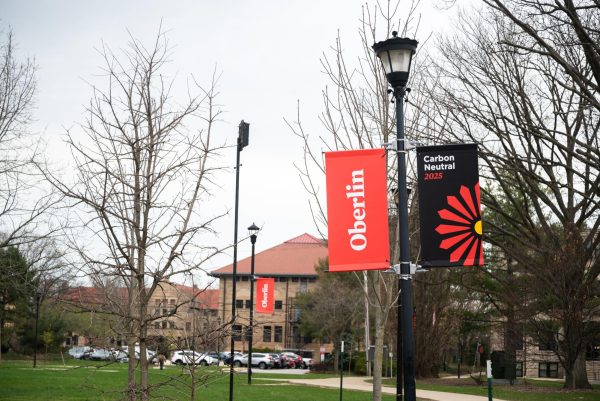SFC Implements New Budgeting Strategy
Left to right: Student Finance Committee members College sophomore Elmo Tumbokon, College senior Meg Parker, and College sophomore Emma Edney discuss changes to finance policy in an SFC meeting.
The Student Finance Committee is planning to introduce a new budgeting strategy aimed at fostering collaboration among student organizations and more efficiently coordinating the timing of events.
The new budget plan will divide clubs and organizations into different councils based on the type of organization. Examples of these councils include religious, cultural, community engagement, and sports organizations. Each council will work with an appointed SFC staffer who will help organize events within each group, with the goal of decreasing overlap.
According to College sophomore and SFC Outreach Coordinator Miriam Khanukaev, the changes hope to structure events in a way that is more conducive to student engagement.
“The thinking behind this was [that] there’s a lot of events on campus that happen at the same time,” Khanukaev said. “We’re trying to create programming to better suit the needs of the students. We want to see purposeful programming and less redundant spending.”
In the past, lack of communication has frequently led to groups planning events at the same time, decreasing student turnout at each.
“There wasn’t any collaboration between similar organizations,” said College first-year and SFC staffer Rebecca Kukushkin.
Though not implemented yet, the SFC hopes the new strategy will be a significant improvement over the current budgeting guidelines.
“We’re going to have two sessions, or more if each club council needs it, and we’re talking about how we’re going to provide clubs and organizations with the autonomy to create programming that best serves their mission,” said sophomore SFC Co-Chair Elmo Tumbokon. “Once we’re in club councils we’ll put that all in the same calendar so we can see how all of our expected programming and events fit into one another.”
The changes will also impact the SFC’s secondary funding process, an important component of its operations which is run on an as-needed basis. The SFC can provide ad hoc funds to groups or individuals seeking to host specific events or cover unforeseen costs. As it stands, students or organizations seeking ad hoc funding must submit a request directly to the SFC organization liaison, who, upon determining its validity, presents it to the committee for a vote. The new council system will streamline the ad hoc process.
“The idea is [that] if organizations or individuals have an ad hoc, they would bring it to the council that it was deemed most appropriate for,” Kukushkin said, emphasizing that proposed ad hoc changes have yet to be finalized. “Those [proposals] will go through the council, and organizations will decide who wants to take it on. [The council] would vote on whether or not they want to do it, and then it would come to a final vote at SFC.”
Along with the creation of councils, the SFC plans to take a more involved approach in handling budgeting processes, emphasizing that organizations should think intentionally about the timeline by which they need funding. This won’t mean that spring-exclusive events such as Folk Fest will need to submit a budget by the fall, but rather that they will be meeting with the SFC more regularly throughout their normal budgeting process.
Though the council system will resolve a number of issues SFC has faced in the past, Tumbokon says the new plan could involve some unforeseen problems.
“A lot of questions still need to be answered, for example how do we determine which organizations … need funding?” Tumbokon said. “What if an organization that was inactive this semester comes back in the Fall but they weren’t here for agenda setting?”
The SFC comprises seven student representatives who are appointed by Student Senate. The committee is responsible for allocating funds to student organizations and providing guidance to individuals interested in starting an organization. The SFC allocates funds to organizations and projects such as ExCos, clubs, WOBC, The Oberlin Review, and the Cat in the Cream.







